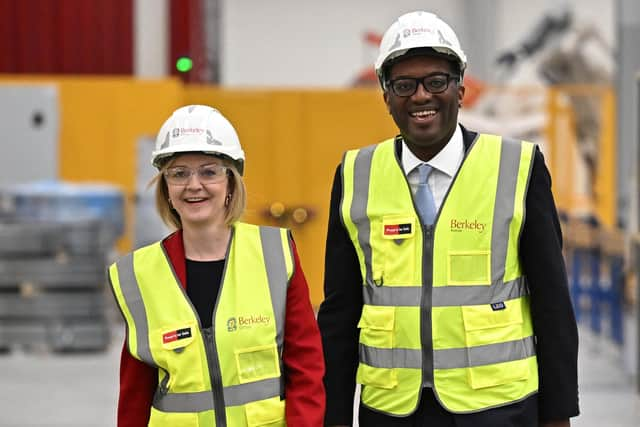Cost of living crisis: Chancellor Kwasi Kwarteng's 'mini-budget' failed to address the winter of worries facing millions – Christine Jardine MP
Perhaps we were expecting too much, but who can blame us, and no doubt the government will claim that other parties were always going to say it was the wrong approach. What else would you expect from the Opposition?
But there was something about the less than rapturous reception in the Commons’ chamber – even from their own party colleagues – which made me wonder if this latest Conservative line-up may come to regret their optimistically titled ‘Growth Plan’ as much as the rest of us.
Advertisement
Hide AdAdvertisement
Hide AdTo be fair, we all knew that recovery from the pandemic was going to be difficult, and that governing through it and the aftermath was unenviable. And no one could have predicted Putin’s war or the chaos it has created in the energy market.
But while the government cannot control external factors, they do dictate the response and its effectiveness. And what we face now are the consequences of its ineffectiveness to date.
Poring over the detail and strategy at the weekend nobody would deny its central tenet that, yes, of course, we need growth to get us out of the recession which is already upon us.
But is this really the way? Give bankers back their bonuses and tell 120,000 people on Universal Credit that if they don’t try harder to find a job their benefits will be reduced?
These is the biggest tax cuts in 50 years, which will eventually cost around £45 billion and could lead to unsustainable borrowing. Yes, we will all have a few more pounds in our pockets to invest in the local economy but what will be the eventual cost?


Whether it works or not we will only know much further down the line, but to package up these measures in a way that barely even touched on the reality of the crisis which is being faced by so many was galling.
With every passing day, and with every email or telephone call I get from a constituent or local business, I have become both increasingly concerned and determined that we need to work together across parties to find a way out of this economic crisis.
Part of me, possibly the part that has bills to pay every month like everybody else, wanted to hear that Kwasi Kwarteng and Liz Truss have indeed come up with a magical formula that had escaped their party colleagues and predecessors in Downing Street.
Advertisement
Hide AdAdvertisement
Hide AdBut what they offered did not provide what I was listening for, either for me or for my constituents. I had already been disappointed earlier in the week by the energy price guarantee proposals from Jacob Rees-Mogg, which I felt were too little and had taken far too long to come up with.
I felt let down again. And I got the distinct impression that I was not alone.
The Conservative benches which cheered Boris Johnson and Rishi Sunak through the trials of the pandemic were less than overwhelming in their support for the new kids on the block.
Oh, of course, tribalism takes over and the more we criticise, the more they defend. But somehow there was a feeling that perhaps this is not a long-term partnership which is destined to lead the country out of the economic darkness.
Nor have they overcome the internal turmoil which has blighted the Conservative party’s entire period in government. In the five years I have been in Parliament, we have had three Prime Ministers.
The revolving door in Downing Street is as much the result of factional in-fighting as opposition focus on their failings.
You have to give them credit for one thing however. They do recognise the main culprits – themselves.
On Friday, we had the astonishing spectacle of a Chancellor who has been a minister since 2018, standing with a Prime Minister who has been in government since 2010 saying “we need a new approach for a new era”, as if to disown everything which their own government had done.
Advertisement
Hide AdAdvertisement
Hide AdIt was a clear admission that previous policies had failed, and it must have felt like betrayal to so many Conservatives who had walked through the voting lobbies alongside both the new Chancellor and Prime Minister over the years. Or those who had applauded, both metaphorically and literally, when Liz Truss and Kwasi Kwarteng warned for years about the risks to families and businesses from ballooning government debt.
Warnings they are now recklessly ignoring and risking the reputation as sound managers of the economy which the Conservatives so cherish.
Indeed the pound fell against the dollar almost immediately after the statement, making it even more expensive to pay for the measures announced.
But while that may worry the City and the financial markets, it is concerns closer to home which most of us will be looking at.
Because while it was undoubtedly a big bold statement, it was also one which did not offer anything to bring immediate relief to those families and pensioners worried about the coming winter.
They will not feel warmed by the thought of more bankers being attracted to this country. Or buoyed up against a winter of worries by the thought that we may have a more entrepreneurial society in the future.
The biggest tax cuts in half a century might seem like a bonus, and of course we all hope that it will all end well, but the stakes are high – for the Conservative party and for the country.
Christine Jardine is the Scottish Liberal Democrat MP for Edinburgh West
Comments
Want to join the conversation? Please or to comment on this article.
